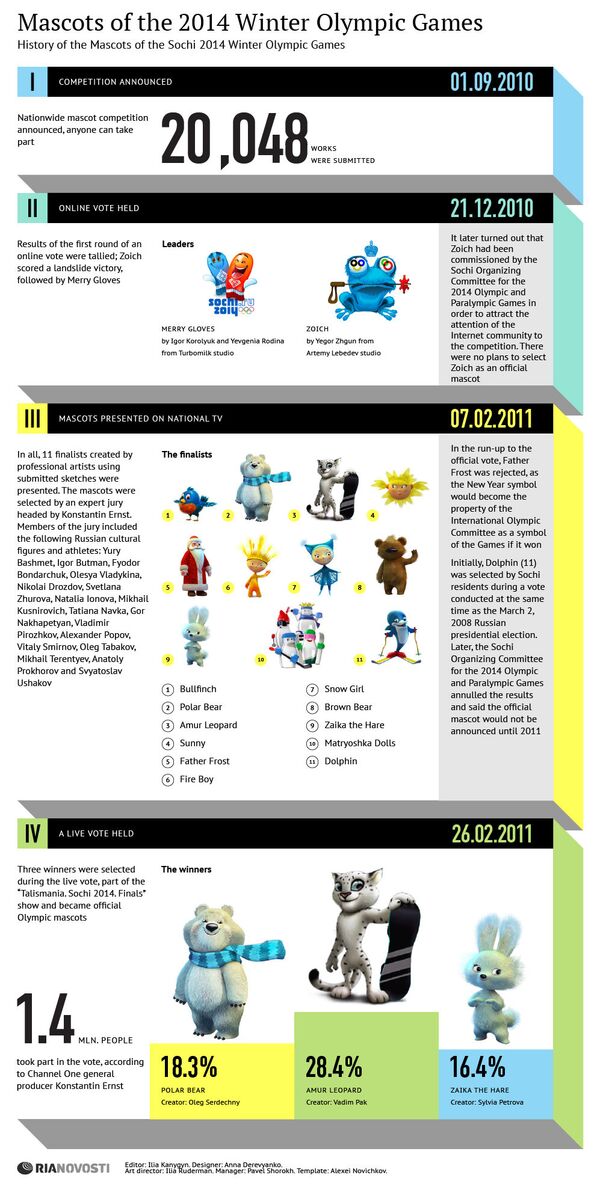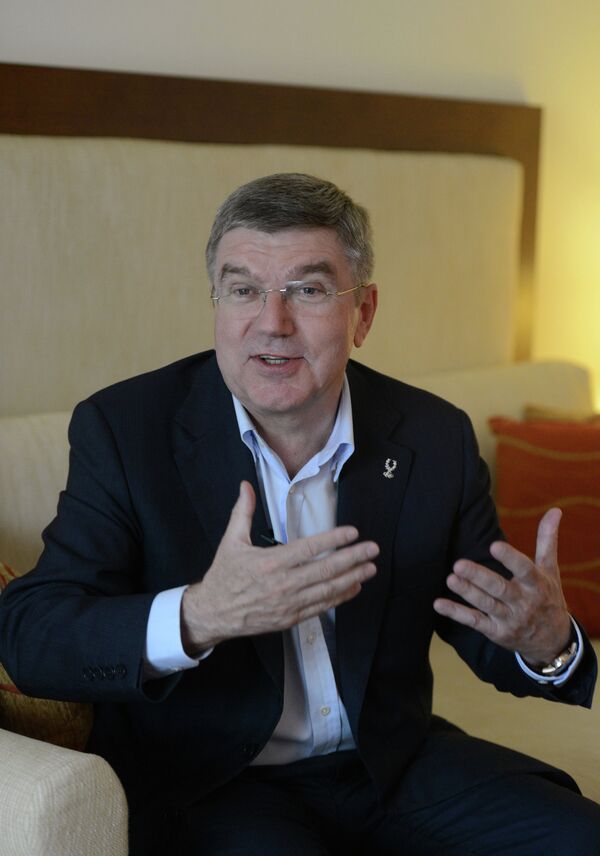ANCIENT OLYMPIA, Greece, September 29 (R-Sport) – In his first exclusive interview since his election as the president of the International Olympic Committee this month, Thomas Bach talks to David Nowak, the chief editor of R-Sport’s English service, about his expectations for the Sochi Winter Games.
Bach, who won a gold medal in fencing at the 1976 Games, spoke an hour ahead of his first official engagement as president – the flame-lighting ceremony for the torch relay in Ancient Olympia.
- What a day for you.
- "It is an emotional day of course because it’s the first trip as IOC president. And being in Ancient Olympia is also very special because these are our roots. It is where it all started. Without Ancient Olympia there would be no Games, I would not be an Olympic champion, I would not be an IOC member. So it’s pretty emotional."
- Would you be sitting here as president if you had flown to Moscow in 1980 to defend your title as fencing champion from the 1976 Montreal Games? You have said that your country’s decision to boycott the Moscow Games prompted your move into sports administration.
- "I don’t know. Because there the boycott and the discussion were a turning point for me. Before I was very much concerned with sports, I didn’t really care about the IOC or sports politics. I did not even know who gave me the gold medal in Montreal. The only, let’s say, the first approach to sports politics was one event in Montreal when I was looking out of the window of our apartment in the Olympic village and I saw that the African athletes had to leave the village and I saw the athletes in tears and having to leave. [Twenty-eight African nations boycotted the Montreal Games in protest at the IOC’s decision to allow the participation of New Zealand, whose rugby team had toured Apartheid-ravaged South Africa. Some nations boycotted days into the Games with their athletes already there – ed.] And there it was the first thought that there is something wrong in the relationship between sports and politics. After winning the gold medal this somehow disappeared. But then it came back with the boycott discussion. And after this I really took the decision that if I can help so that something like this does not happen to athletes in future generations then I’m ready to help. So you may be right. If we would have gone to Moscow then maybe my life would have been totally different."

- Do you agree that the Sochi Olympics may not be the simplest start for you as IOC president? Today’s flame could be headed to Salzburg or Pyongchang, perhaps lower-risk options.
- "It is not a question of risk. Before any kind of Olympic Games you have discussions, and this on the other hand shows the fascination about the Olympic Games and their relevance in society. In any place you would have some discussions. Therefore I’m really looking forward to an excellent Games in Sochi knowing that in the next couple of months there will be some discussions that we have to face. I think we have good arguments, we have our philosophy and we have to defend it."
- I read your election manifesto
- "You are one of the few?" [Laughs]
- You use the word "discrimination" twice and you talk of the need for a zero-tolerance policy toward it. Does that mean you regard the new law against promoting non-traditional relations in Russia as non-discriminatory?
- "The task of the IOC is to make sure that the Olympic Charter is applied. That it is 100 percent applied. The charter applies to the Olympic Games and the participants. There has to be zero tolerance and we have to make sure that in the Olympic Games and for all the participants there is no discrimination in whatever form. On the other hand, the IOC is not a supra-national parliament that can impose laws on a country outside the Olympic Games. There, with respect to Sochi, we have the assurances of the highest authorities in the country. And in fact yesterday I had another conference with the Russian delegation, and they assured me again that in the Games and for the participants of the Games there will be no discrimination whatsoever."
- Does that zero-tolerance policy apply to athletes who decide they want to protest at the Games?
- "As a sports organization we have to protect the athletes. And having been an athlete myself I know the last thing you want to be drawn into during the Olympic Games are political controversies. We had those in Montreal. I gave you the example of the African athletes. I could speak about security at the time and many other issues. There it is our task to protect the Olympic village. It cannot be a marketplace for demonstrations for all potential issues in the world, even if they are the best ones, maybe. Our world is diverse and the Games should be giving an example that in spite of all differences, of all controversies, people can live together and respect each other, and they are not there to create confrontation. We have to protect the athletes."
- What did you know of Sochi before it won hosting rights?
- "Quite a lot because I was the chairman for the evaluation commission of an earlier bid of Sochi for the Games in 2002. So I have been there, I have seen the region quite a bit."
- So in that case were you surprised to see it win hosting rights, what with very little infrastructure already in place?
- "It is not a question of being surprised, it was a good bid that you could see and they had the approval of all the winter sports federations for all their plans, so the technical approval, which is quite important in winter sports, because in summer sports it is easy to move a swimming pool from here to there. But to move a mountain is a little bit more difficult. They had a technically sound bid. The reason for this bid was a sovereign Russian decision. Russia as a winter sports country did not have any winter sports facilities there. The Russian championships in speedskating were competed for in Berlin. So Russia decided that as a winter sports destination they should have a winter sports center. They chose Sochi. This is a decision we have to respect and, if the Winter Games can serve as a catalyst for this, then this is a respectful decision."
- Another aim from your manifesto was to reduce the cost of the Games, and I wonder whether that means that bids like Sochi’s, where you have to start from scratch, stand less chance of winning in the future.
- "If you read it, it is not only reducing costs, it is to devise a concept of sustainability and there, in this concept, to respect the diversity, to respect the different standards in the different countries. So this is the concept with regard to the individual candidature. You would have one candidature like Sochi or others where you want to develop sport in a region, in a country where you have to start from scratch. If this project fits into a sustainable long-term development plan of the country and the region, you’re welcome. On the other hand, you have bids from another continent, another culture and either you have already established a certain standard [of infrastructure – ed.], you’re welcome, or you have another standard and you still have to develop, but maybe not to the level of a new world sport’s center, you’re also welcome. What I’m pleading for is that these different standards, this diversity, we consider this to be an advantage and that we should make sure that potential bidders are telling us how they see the Olympic Games fitting into their sustainable development – rather than the IOC, at a very early stage, giving them too many conditions and maybe demanding too much too early."
- You’ve spent two or three weeks as IOC president but you know the organization well, having been there for a long time. What’s the biggest thing that needs to change about the IOC?
- "I think it is a different style and what I’m standing for is a style of dialogue and participation. Good governance is not only transparency and compliance, this is very important, but the third pillar of good governance is participation. So I want to encourage the membership to participate and to empower the membership. And this requires a lot of dialogue and a lot of discussion. This is a question of style. The issues are, and you’ll find this in my program, the sustainability, starting from the bidding process through the management of the Games to the program. This is credibility. This means zero tolerance with regards to sports competitions – doping, manipulation and corruption. This means good governance, which means credibility for the organization. Third one, good governance including sports participation. Fourth one is youth. But youth in a way that we motivate youth to practice sports. It’s good to have them reading about sports, listening to sports and watching sports. But this cannot be the ultimate goal for the IOC. We have to get the couch potatoes off the couch and this is quite a challenge because we see the figures for participation in sports decreasing in most parts of the world."
R-Sport is the sports arm of RIA Novosti, the host news agency for the Sochi Winter Games.



